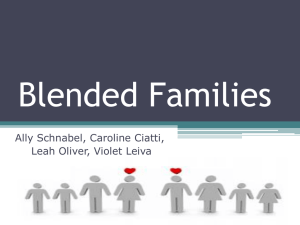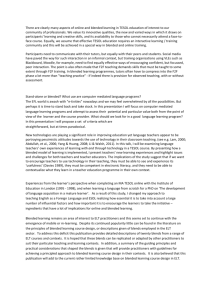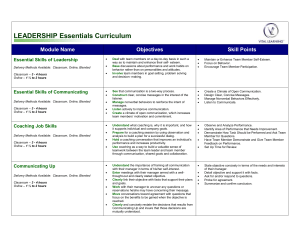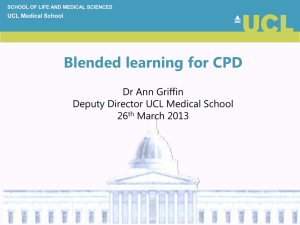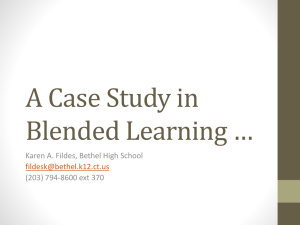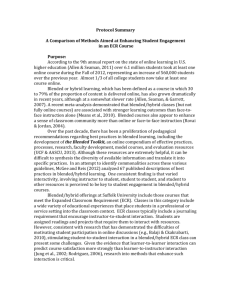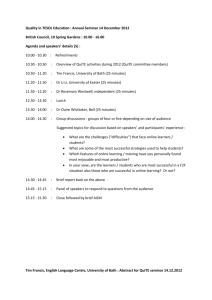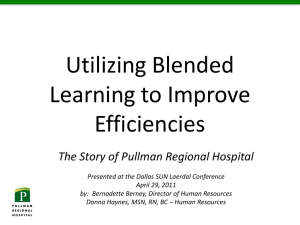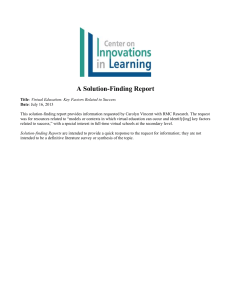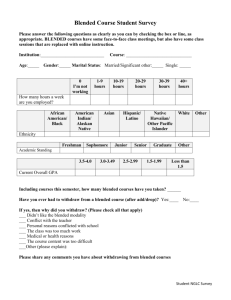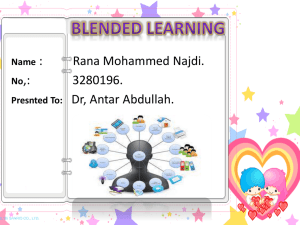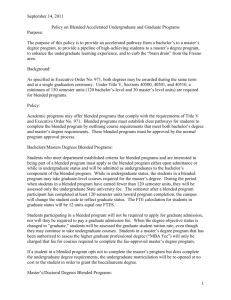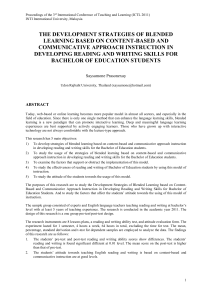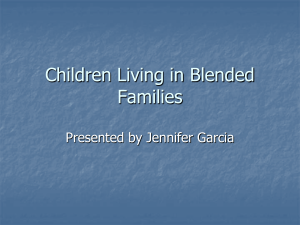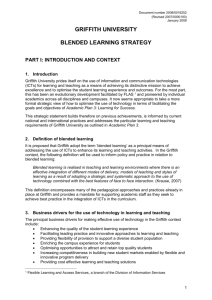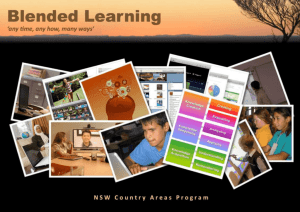Binuclear Families / also considered as two
advertisement
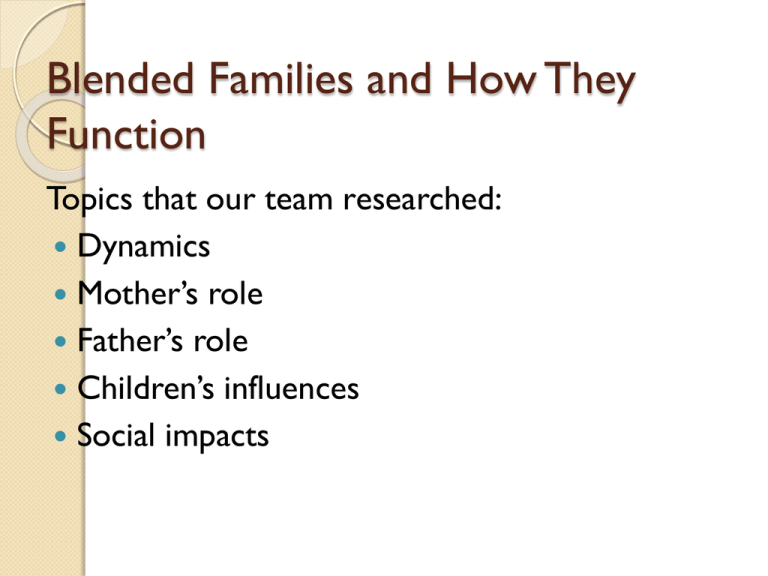
Blended Families and How They Function Topics that our team researched: Dynamics Mother’s role Father’s role Children’s influences Social impacts Binuclear Families / also considered as two nuclear families combined or blended families. This is just the beginning of the tree, it’s branches involve grandparents, aunts/uncles, cousins ect. • Father / Ex Husband of Previous Marriage • Mother / Ex Wife of Previous Marriage • Step Mother Son / Daughter Son / Daughter Step Son / Daughter / Brother / Sister Step Son / Daughter / Brother / Sister • Step Father Dynamics Dynamics can range from a multitude of areas Anger and hostility Conflicts between Parents and parenting styles, values, and aspirations The shifting of roles and relationships between former spouses Relationships between siblings, cousins, Aunt/Uncle, Grandparents, Parents and their appropriate step-catagory What are some common issues in a blended family? Children of the other parent feeling left out or like they are not getting enough attention. Children feeling like things are un fair due to differences in boundaries being held. Stress between parents because of finances, parenting styles, custody, child support, visitation, and spousal support. Parents feeling a lack of respect from the other children because of trust issues or defiance. Something to take into consideration! Overall there is a mixture of all kinds of aspects, emotions, and conditions in which a lot of conditioning and support needs to be in place for the two families to become somewhat of a whole. Children will have the hardest part in all of this with learning how to basically share their parents and or their surroundings. It is up to the parents to sacrifice and do what they need to do to help the children and the family to work at becoming a cooperative system within the life they want to have. It is not impossible for divorced families to merge and to develop new family values between each other, it’s all about the work you put into it. Mother’s Roles Social pressure Mothering has been emphasized as a woman’s true purpose in life for over 200 years. Intensive mothering- Traditional modeling of socially acceptable mothering. ◦ Mothers are expected to expend tremendous amounts of time and energy in raising children. ◦ This creates conflict and guilt in women who desired to fulfill both the ideal roles of mother and pursue their own dreams and ambitions. Mother mandate- Learned guidelines that are used to socialize girls to be sensitive and nurturing to other’s needs assume the roles of caretaking. Loyalties Usually Mother’s loyalties lie with the children. ◦ Feel they need to make up for any hurt the child has experienced due to a divorce/death. ◦ The child/mom relationship predates the new relationship. Parenting styles Protective mother’s will engage in four types of behavior. ◦ Defender- The need to protect their children from any harm, even if it means from their new spouse. ◦ Gatekeeper- Controls the child/stepdad interaction keeping them in “separate roles” ◦ Mediator- Steps in when conflict arises between child and stepdad to help maintain control over the family environment. ◦ Interpreter- Usually simultaneous with mediator role, where mother tries to explain each family member to the other. Traditional vs. Blended Family Expectations for the Family ◦ The desire to recreate the family into a Traditional Nuclear Family. ◦ Actual experiences generally differed from expectations Expectations for their partners’ roles ◦ Generally were expected to provide financial and emotional support for mother and children. ◦ Often less gendered than first marriage families, women find themselves still covering all of the roles like in a single parent home. Fathers roles Expectations Depending on the situation expectations vary. Your relationship with your biological kids may decline because most will choose to live with there mom over there dad. If desired become a “super dad” May not be easily accepted by spouses children Age can change everything Establish respect from your step children along with helping you spouse receive the same respect from your children. Know that your spouse and its biological child will always have a stronger closer relationship. Being a father in a blended family Try to treat each child as equal as possible. Be on the same page as you spouse with disciplining and rules. Spend one on one time with each child. Establish trust with you stepchildren Time and Patience What NOT to do Don’t “replace” any child’s father, be yourself. Money can’t buy you love Don’t talk down to your stepchildren Do not discipline step children (especially at first) Don’t forget about your biological kids and your relationship with them (may be different) Don’t force children to like you. A Child’s Influence How a child can influence the decision to remarry: Point 1: Child’s Age and Gender, Parent’s gender ◦ How gender can impact the decision to remarry ◦ Which roles need to be adopted Point 2: Circumstances of Separation ◦ How or why the natural family separated ◦ How this may affect the children The Child’s Age and Gender and The Parent’s Gender A child’s gender typically determines the type of relationship with each of their parents. The opposite gender parent alone may not be what the child needs while growing up. The age of a child can sometimes determine how well they will adapt to being in a blended family. Younger children may be more accepting towards new family, while older kids and teenagers might be less accepting. The Family’s Separation A parent affected by divorce may make the decision to remarry more quickly than a parent faced with the loss of their spouse. Children may sometimes need more time to grieve the loss than their parent, but are still important in deciding to remarry. Grieving children may be unable to fully accept a new parental figure. Depending on the circumstances of their parents’ divorce, children may feel differently about the idea of having step-family. Social Impact of a blended family Social impacts on children More than half of school aged children are in a blended family. A stepfamily can be "simple," in which only one member of the couple has a prior child or children, or it can be "complex" or "blended." In a blended stepfamily, both members of the couple may have had pre-existing children, or the couple may have additional children together The children in stepfamilies and non divorced familes scored significantly different on measures of intellectual functioning. However, all of the means were in the average above range, analyse of the self-esteem and self –concept data indicate no overall difference etween the two family groups. Children’s self-report of life stress ◦ Girls in stepfamilies are reported more negative stress than those in nondivorced families. ◦ Also shows that communication patterns were less effective. ◦ Both stepmother and father have rated their families as less cohesvive than parents in nondivorced families. Parents ◦ The most common form of blended family is a mother and stepfather arrangement, since mothers often maintain custody of the children ◦ Parents of a blended family reported almost twice as many positive and negative life stressors than adults in intact families. ◦ Remarriage can be defined as a stressor event because it changes the family boundary by adding or taking away one or more members, forming a newly constituted family. Boundary ambiguity has more to do with perceptions than actions, which is how it is separate from inclusive social identity as a family. The rituals and actions demonstrated by the family help shape the outlook of the members. Conclusion Different roles within the families Social impact, how families are changing Not widely studied yet, mainly because the changes are recent The best studies of families are long term



